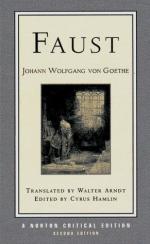The value of form, in a poetical work, is the first question to be considered. No poet ever understood this question more thoroughly than Goethe himself, or expressed a more positive opinion in regard to it. The alternative modes of translation which he presents (reported by Riemer, quoted by Mrs. Austin, in her “Characteristics of Goethe,” and accepted by Mr. Hayward),[A] are quite independent of his views concerning the value of form, which we find given elsewhere, in the clearest and most emphatic manner.[B] Poetry is not simply a fashion of expression: it is the form of expression absolutely required by a certain class of ideas. Poetry, indeed, may be distinguished from Prose by the single circumstance, that it is the utterance of whatever in man cannot be perfectly uttered in any other than a rhythmical form: it is useless to say that the naked meaning is independent of the form: on the contrary, the form contributes essentially to the fullness of the meaning. In Poetry which endures through its own inherent vitality, there is no forced union of these two elements. They are as intimately blended, and with the same mysterious beauty, as the sexes in the ancient Hermaphroditus. To attempt to represent Poetry in Prose, is very much like attempting to translate music into speech.[C]
[A] “‘There are two maxims of translation,’ says he: ’the one requires that the author, of a foreign nation, be brought to us in such a manner that we may regard him as our own; the other, on the contrary, demands of us that we transport ourselves over to him, and adopt his situation, his mode of speaking, and his peculiarities. The advantages of both are sufficiently known to all instructed persons, from masterly examples.’” Is it necessary, however, that there should always be this alternative? Where the languages are kindred, and equally capable of all varieties of metrical expression, may not both these “maxims” be observed in the same translation? Goethe, it is true, was of the opinion that Faust ought to be given, in French, in the manner of Clement Marot; but this was undoubtedly because he felt the inadequacy of modern French to express the naive, simple realism of many passages. The same objection does not apply to English. There are a few archaic expressions in Faust, but no more than are still allowed—nay, frequently encouraged—in the English of our day.
[B] “You are right,” said Goethe; “there are great and mysterious agencies included in the various forms of Poetry. If the substance of my ‘Roman Elegies’ were to be expressed in the tone and measure of Byron’s ‘Don Juan,’ it would really have an atrocious effect.”—Eckermann.
“The rhythm,” said Goethe, “is an unconscious result of the poetic mood. If one should stop to consider it mechanically, when about to write a poem, one would become bewildered and accomplish nothing of real poetical value.”—Ibid.
“All that is poetic in character should be rythmically treated! Such is my conviction; and if even a sort of poetic prose should be gradually introduced, it would only show that the distinction between prose and poetry had been completely lost sight of.”—Goethe to Schiller, 1797.




